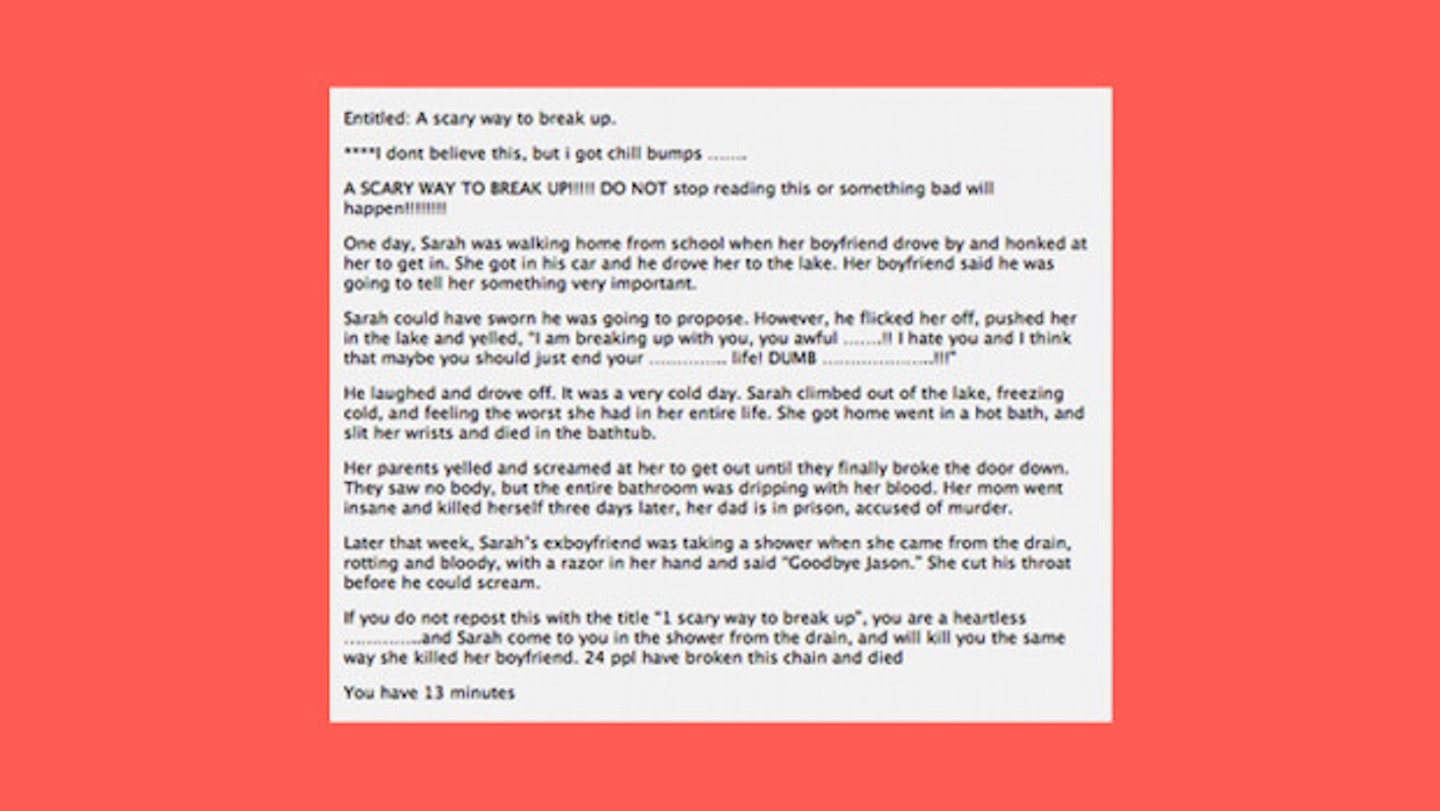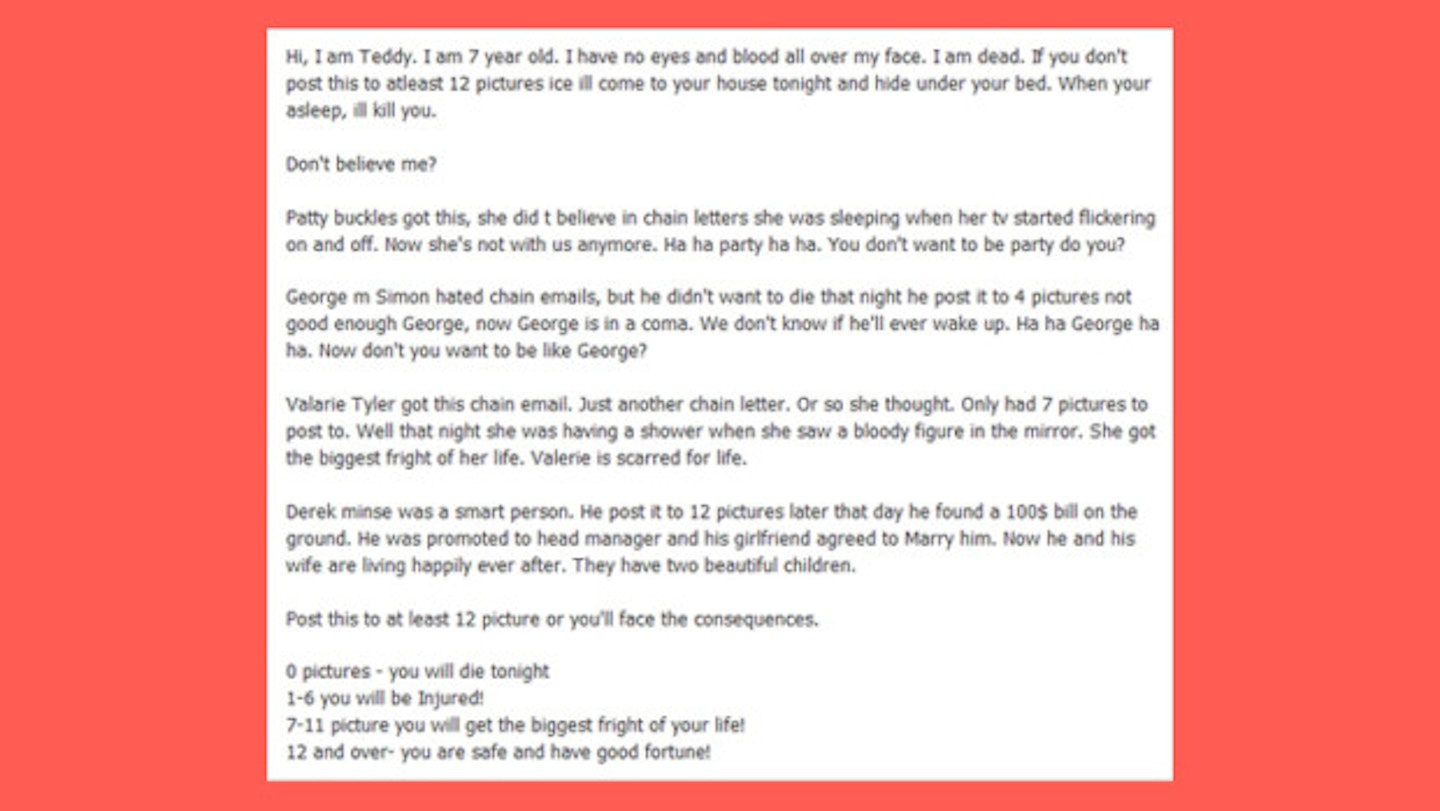We’ve all seen chain Facebook statuses before. Often riddled with typos and randOM CAPslock, they attempt to scare us into sharing their tabloid-headline messages with pals. ‘Warning to all parents!! The Talking Angela applets strangers creep on your kids when they press the heart button. DELETE THE APP AND WARN YOUR MATES,’ they screech. ‘Now you’ve seen this picture you’ll be haunted by two ghosts from Katy Perry’s ‘T.G.I.F’ video if you don’t share this message with six friends!!!.’ they scream.
And, depending on who you are, they either leave you racing to press the ‘share’ button or bashing your head against the keyboard, like ‘seriously, who the hell believes this shit?!’.
The latest in this long line of ‘omg, tell your friends’ type posts are a couple that claim Facebook is going to start charging for private accounts and/or steal all your personal information. The statuses - which start like ‘As of September 28th, 2015 at 10:50 pm, I do not give Facebook or any entities associated with Facebook permission to use my pictures, information, or posts…’ - have been drifting around the internet for years now, but Facebook has just confirmed (yet again) that they’re a big ol’ pile of lies.
It’s no surprise that chain messages like this exist. We spent the nineties posting those ‘longest chain letter ever’ world record attempts to our mates (they were fake, by the way) and in the noughties we spammed each others’ Hotmail accounts with 10-years-bad-luck stories featuring the girl from The Ring. Chain Facebook statuses are just the natural next step. But, how is it that some people fall for the hoaxes time and time again, while others can always tell that they’re obviously untrue? And, how do they start in the first place?
James, 22, run a subReddit called ‘SuperChainGang’. The group acts as a safe space for ‘superstitious people’ to pass along this new kind of digital chain mail without judgement, and had hundreds of members at its peak: ‘Some people are really scared of this stuff, and others just like to play it safe,’ he explains, admitting that he often shares chain posts.
‘Do I really think a ghost will kill me in my sleep if I don't share an image with six different people?’ Probably not. Better safe than sorry though, right? I think most people who share this stuff think the same.’
Dr. Pamela Rutledge agrees. A psychologist who specialises in social media, she describes chain statuses as a ‘subtle, passive aggressive form of bullying’. She says: ‘We’re more likely to engage with threats that are within the range of possibility, or which are impossible to prove wrong, or that trigger innate fears, such as harming a child. Our initial responses are innate and in some cases difficult to cognitively override when the ‘cost’ of forwarding seems low.’
While we once had to shell out for a pack of stamps and exert the effort of photocopying 20 chain physical letters to keep our paranoia about a bad luck curse at bay, now all we need to do to avoid harm is copy and paste a status. For some people that’s a very low price to pay, for others the risk of looking stupid in front of all their friends seems like a much higher cost.
‘We have to choose between feeling silly for believing or risking the threatened outcome,’ says Pamela. ‘We consciously know it is irrational, but we also have those innate, biological fears, especially if we’re reacting to protect those around us, rather than ourselves.’
This might explain why the people who share chain posts tend to be the same people who over-share on Facebook in general. If you’re comfortable posting a photo of your Thornton’s chocolate box, captioned ‘he broke up with me, which one should I eat next?’ you’re probably going to be okay with sharing a status just in case Facebook might start charging. The impact of this is increased for those who are less tech-savvy and those who have people they want to protect - aka your mum and dad. Search for ‘Facebook hoax’ on Twitter and you’ll find hoards of cocky kids laughing about their parents falling for the chain messages.
In fact, chain messages are often started by someone who’s trying look out for their friends or family. ‘A Facebook user might read an article that’s factually incorrect or that they misunderstand, and then want to share that information with their friends to protect them,’ says internet security expert Graham Cluley. ‘Things get worse when a hoax spreading on a social network gets reported on, say, a radio station as fact. It gets a new lease of life and begins to be spread off the internet as well.’ That’s not always the case though; Graham adds that they are ‘sometimes created mischievously or maliciously’.
According to rumour-debunking site Snopes, the recent ‘paying for Facebook hoax’ might have its roots in a scam from 2009. Hackers spread a lie that Facebook was going to start charging for its services in order to get users to click on their fake protest page. Snopes reports: ‘The protest page was a trap for the unwary; clicking on certain elements of it initiated a script that hijacked users' computers. Some of those who did venture a click had their computers taken over by a series of highly objectionable images while malware simultaneously attempted to install itself onto their computers.’
While the malware is long gone, the hoax has remained as a six-year-old Chinese whisper – and the more it’s talked about, the longer it will stay with us. In fact, some of the chain letters we once sent as emails in the noughties still exist online for that reason. We’ve been sharing messages saying that Bill Gates is giving away free money since around 2004. ‘Real computer malware we can kill off,’ says Graham. ‘Chain letters and virus hoaxes will probably be with us forever.’
SHARE THIS POST WITH 14 FRIENDS OR A GHOST DRESSED AS CHER WILL HAUNT YOU UNTIL THE DAY YOU DIE SINGING ‘TURN BACK TIME’ AGAIN AND AGAIN.
A Brief History Of Chain Letters You Will Remember
 1 of 7
1 of 7The (scroll down) one
Three weeks later: still scrolling (found here)
 2 of 7
2 of 7The Bill Gates Giveaway
'So I think you should give away some money, Bill. No, not to a charity. I'll just badly photoshop something and put it on Facebook. (Found here)
 3 of 7
3 of 7The Religious Ones
OH WOW I had no idea that this is how religion works!
 4 of 7
4 of 7The Scary Ones
You'd better listen up because everyone will be dead in 13 minutes if you don't forward this on.
 5 of 7
5 of 7The You're So Hot One
Aw thanks babe! And oh my god you're so clever making the Playboy Bunny out of letters lol (found here)
Like this? You might also be interested in...
How To Get Money From Your Friends Without Sounding Like A Dick
Follow Kate on Twitter: @kateelloud
This article originally appeared on The Debrief.


